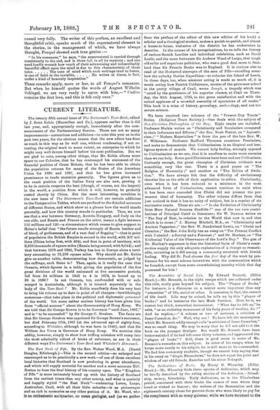CURRENT LITERATURE.
The twenty-fifth annual issue of The Statesman's Year-Book, edited by J. Scott Keltie (Macmillan and Co.), appears earlier than it did last year, and, appropriately enough, immediately after the com- mencement of the Parliamentary Session. There are not so many improvements—corrections and additions—to note this year as in the past two years, for the obvious reason that the new editor has done as much in this way as be well can, without condensing, if not re- casting, the original work to some extent, an enterprise to which he might very well devote himself before his next publication. But we are glad to note, among other things, that Mr. Keltie allows more space to our Colonies, that he has rearranged his statement of the financial position of Great Britain, that he has been able to obtain the population returns for many of the States of the American Union for 1886 and 1887, and that he has given increased prominence to trade statistics generally. The figures given as to the exact position of the Italian Navy are also new, proving it to be in certain respects the best (though, of course, not the largest) in the world, a position from which it will, however, be probably ousted shortly by China. But the most interesting novelties in the new issue of The Statesman's Year-Book are certain additions to the Comparative Tables, which are prefixed to the detailed accounts of different States, and which show at a glance how the world stands generally, and how this country stands in particular. Thus, we now see that a war between Germany, Austria-Hungary, and Italy on the one side, and Russia and France on the other, means a fight between 116 millions and 126—a circumstance which seems to give support to Heine's belief that "the future smells strongly of Russia leather and of blood, of godlessness, and of a vast deal of flogging "—that in point of population the British Empire is second in the world, with 307 mil- lions (China being first, with 404), and first in point of territory, with 9,339 thousands of square miles (Russia being second, with 8,644) ; and that between 1878 and 1886, Turkey has lost in Europe alone a terri- tory amounting to 75,588 square miles. Why should not Mr. Keltie give us another table, demonstrating how democratic, as judged by the suffrage, each State is ? Then, again, is it really the case that Oceania, which figures in a table giving the population of the five great divisions of the world estimated at five successive periods, fell from 24 millions in 1845 to 4 in 1874, to bound up to 38 in 1886 ? Is not Oceania, too, confounded with or sub- merged in Australasia, although it is treated separately in the body of the Year-Book ? Mr. Keltie manifestly does his very best to bring his volume up to date in point of all changes—bewilderingly numerous—that take place in the political and diplomatic personnel of the world. Yet some rather ancient history has been given him from "official sources" about the Governorship of Hong Kong. We are told that Sir George Bowen is to be Governor " until June, 1887," and is " to be succeeded " by Sir George C. Strahan. The facts are that Sir George Strahan was appointed Sir George Bowen's successor, but died February 17th, 1887 (at the advanced age of eighty-four, according to Whitaker, although he was born in 1840), and that Sir William des Wens is Governor of Hong Kong. We mention this oddity, however, simply to show how trifling mistakes will creep into the most admirably edited of books of reference, as are in their different ways The Statesman's Year-Book and Whitaker's Almanack.


































 Previous page
Previous page